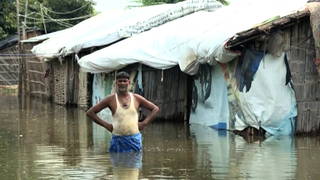
Guests
- Gopalakrishnan Ananthakrishnanmanaging editor of The Hindu newspaper. The paper did not print today for the first time in its 137-year history due to massive floods.
Links
In India, one of the country’s oldest newspapers, The Hindu, did not print today for the first time in more than a century due to massive rains and floods in the southern city of Chennai. The publisher said it was the first time the daily paper has failed to publish in its entire 137-year history. Local officials say floods have killed 188 people over recent weeks, and the Indian government has deployed the army to rescue thousands of people stranded in Chennai. We speak with the managing editor of The Hindu, G. Ananthakrishnan. “We don’t know how we’ll distribute the paper tomorrow. It’s going to be very difficult,” Ananthakrishnan says. “It’s a deluge.”
Transcript
AMY GOODMAN: We’re broadcasting from COP21, from the U.N. climate summit. We’ll be here for the full two weeks of the summit. Meanwhile, in India, one of the country’s oldest newspapers was not printed for the first time in more than a century due to massive rains and floods in the southern city of Chennai. The daily newspaper, The Hindu, did not come out today, because workers couldn’t access the press. The publisher said it was the first time this has happened in the entire 137-year history of the paper. The Indian government has deployed the army to rescue thousands of people stranded in Chennai as heavy flooding continues.
We’re joined right now by the managing editor of the paper. We’re joined by Ananthakrishnan.
Welcome to Democracy Now!.
G. ANANTHAKRISHNAN: Thank you
AMY GOODMAN: So we were just talking yesterday in our office, and then we get this news. I know you just have a few minutes. Talk about the significance of what’s happened to The Hindu, your newspaper, and where Chennai is in India.
G. ANANTHAKRISHNAN: Well, The Hindu is one of the oldest newspapers in India. It was started in 1878, and it’s published all over the country. There’s a long tradition of supporting liberal journalism and credible newsgathering. So, it’s the first time that this has happened, due to circumstances entirely beyond our control. And we are on the southern east coast of the country, which is normally prone to hurricanes and cyclones, as we call them. And so, this is the first time that we have been hit by 50 centimeters of rain in one day. And we have found that the whole city, which is flatland basically, and which has gone completely under. It’s the first time it’s happened.
AMY GOODMAN: The reports are that at this point something like 188 people have died in recent weeks as a result of the floods.
G. ANANTHAKRISHNAN: We have had three spells of really bad rain in this season. And already we had information that 60-odd people had died in the past two instances, and I’m not surprised that more people have died. There’s a lot of background to this, in the sense that, you know, the real estate development, which is uncontrolled, and the whole change in the climate and the intensification of the kind of weather that we are witnessing in Chennai and even some of the cities along the coast, in Tamil Nadu. It’s a clear cause of worry.
AMY GOODMAN: It’s—of course, the horror is how many people have died, but the irony of the newspaper not coming out as your team is here covering the climate summit, about what to do about climate change.
G. ANANTHAKRISHNAN: Yes, actually, Chennai is the base of the newspaper, in fact, a nerve center. And it is where we have our largest circulation and our greatest voice. And this being the case, it’s a real tragedy that the paper couldn’t come out, for the first time, in this fashion. And the whole city—
AMY GOODMAN: What happened at the presses? Did you have a description, report back from home?
G. ANANTHAKRISHNAN: Yes, some of the people were able to come into work, because some of the train lines that are running overhead, they’re still continuing to operate. With great difficulty, a few staff have managed to come to the office, and we have the edition going for tomorrow. So, that’s at least on the cards. But we don’t know how we will distribute the paper tomorrow. It’s going to be very difficult. And the presses are away from the actual printing center, the main center. So the printing center is away about 45 kilometers to the south, which is, again, along the coast. And it’s very difficult to—you know, for people to reach when large swaths of the city and the surrounding areas are inundated. It’s a deluge.
AMY GOODMAN: I want to thank you, Ananthakrishnan, Managing Editor of The Hindu, one of the largest daily newspapers in India. Again, The Hindu not printed for the first time in more than a century due to massive rains and flooding, which made the press inaccessible.












Media Options